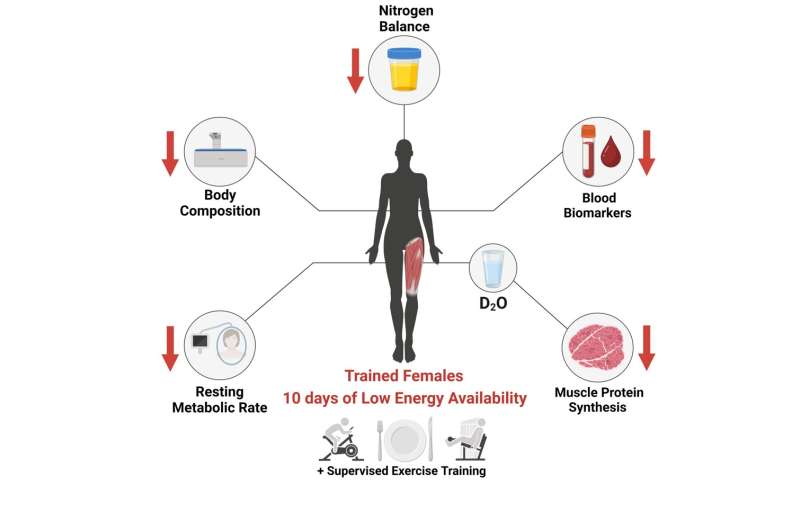This article has been reviewed according to Science X's editorial process and policies. Editors have highlighted the following attributes while ensuring the content's credibility:
fact-checked
peer-reviewed publication
trusted source
proofread
Inadequate energy intake affects female athletes, study finds

A new study from Aarhus University shows that when female athletes lower their energy intake and increase their training, their health and the ability of their muscles to respond to training are negatively impacted. The research is published in The Journal of Physiology.
Diet and training go hand in hand if you want to achieve the best results. Most athletes know this, and many of them closely monitor their energy intake and training. However, a new study from the Department of Public Health at Aarhus University shows that the bodies of female athletes are negatively affected when the athletes consumes too little energy through their diet in comparison with their training volume, explains Ph.D. student Mikkel Oxfeldt. He and Associate Professor Mette Hansen are behind the study.
"We know that both elite female athletes and active women at times, either consciously or unconsciously, don't have an energy intake that matches their energy expenditure when training. The study shows that insufficient energy intake can negatively affect muscles' ability to respond to training. After just ten days of low energy intake, we began seeing changes to the hormonal system such as a decrease in the metabolic hormone followed by a decrease in metabolism."
The study shows that it is important that women are careful about not reducing their energy intake too much. In fact, they should actually be increasing their energy intake if they increase their training volume, says Mikkel Oxfeldt. "When you don't get enough energy from your diet, your body will begun to pare down processes that require a lot of energy, just like a mobile phone that goes into battery-saving mode. We know from previous studies that it can cause some women's periods to stop. However, our results show that other processes in the body, such as building new muscle proteins, are also affected."
We must confront the unilateral focus on weight
Thirty fit women between the ages of 18 and 30 participated in the study which is part of the Team Denmark network called "competition preparation and training optimization." All the women started the study right after the start of their menstrual period and followed a very controlled training and diet regimen for three weeks.
"Under the supervision of the researchers, the participants carried out individual training programs aimed at increasing muscle mass, strength and overall fitness. The women's meals were also provided by us. By controlling their training regimen and their diets, we were able to see how much energy they expended and what they ate during the study," says Oxfeldt.
"This is the first time that such a well-controlled study has been carried out in this area, where both the diet and training of a group of fit women has been regulated to this extent. During the study, all participants drank doubly labeled water, which is enriched with a trace material. When we combine this tracer technique with the retrieval and subsequent analysis of muscle tissue samples, we can gain detailed insight into the muscles' response to the experimental protocol," explains Oxfeldt.
The researchers believe it's necessary to confront the idea that weight loss leads to medals when in fact weight loss can negatively impact a number of the body's systems, including muscles.
"In recent years, we've heard about public weigh-ins within some elite sports. They are part of promoting a culture in which some women are constantly trying to lose weight. However, our results show that this focus on weight loss can have short and potentially long-term negative consequences for women, both in relation to their health and training results. The study will hopefully provide athletes and coaches with a more nuanced picture of possible side effects," says Oxfeldt.
In collaboration with colleagues from the University of Copenhagen and University of Southern Denmark, the researchers behind the study are now investigating how physical performance, the immune system and metabolism are affected by an insufficient energy intake. They hope to one day be able to establish whether there is a difference between how women's and men's bodies react to inadequate energy intake.
More information: Mikkel Oxfeldt et al, Low energy availability reduces myofibrillar and sarcoplasmic muscle protein synthesis in trained females, The Journal of Physiology (2023). DOI: 10.1113/JP284967




















